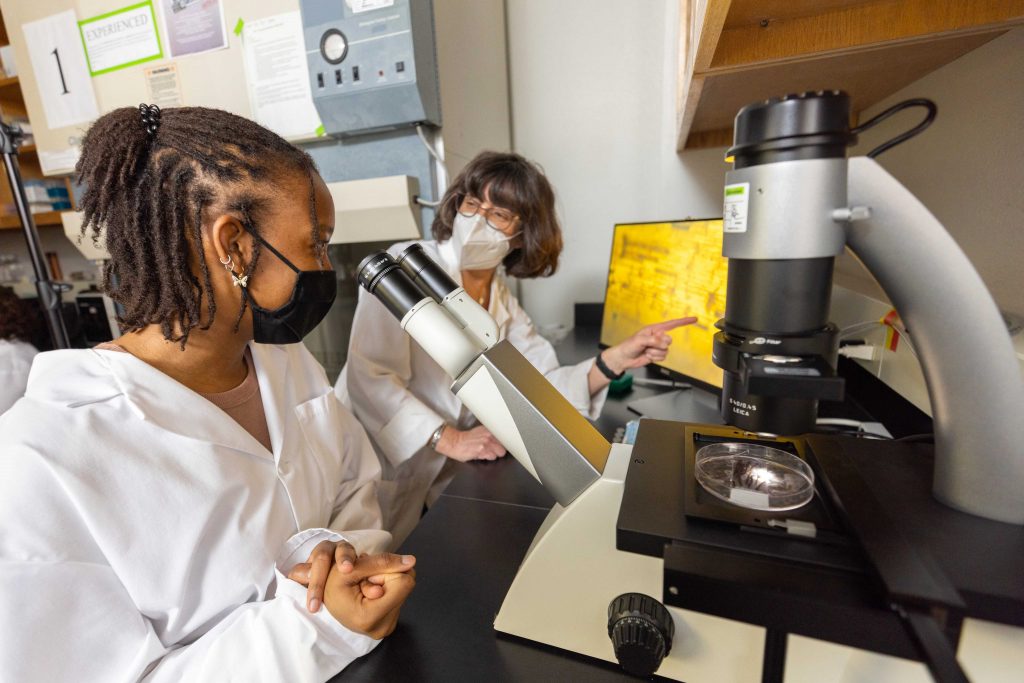According to the National Center for Education Statistics, only 10 percent of all master’s degrees were awarded to Latinx students between 2015-16, and a stunningly low 1 percent to Indigenous students. The situation for Ph.D. students is even more dire, with only 8 percent of Ph.D. graduates coming from Latinx populations and less than 1 percent from Indigenous populations.
Students representing these populations often encounter systemic racism, discrimination and bias through prevailing institutional and departmental policies and practices, which disrupts their pathways to earning higher degrees, especially in science, technology, engineering and math (STEM).
The workplace of the future will increasingly focus on STEM jobs, including occupations in life sciences, physical and Earth sciences, engineering and architecture, computer and math occupations as well as health-related occupations like health care providers and technicians. Even as the demand for educated workers in STEM fields grows—and with it, earnings potential—experts believe there is little indication that diversity in STEM-related graduate programs will significantly shift any time soon unless major changes are made within the academic system itself.
To address these inequities on an institutional level, a multidisciplinary team of Northern Arizona University researchers recently launched two related projects, supported through nearly $1.3 million in funding overall. The team includes principal investigator professor Catherine Propper of the Department of Biological Sciences and her co-investigators, assistant research professor Anita Antoninka of the School of Forestry, professor Monica Brown of the Department of English and professor Angelina Castagno of the Department of Educational Leadership, who also is director of the Diné Institute for Navajo Nation Educators.
The Alfred P. Sloan Foundation has awarded Propper and the team a $499,750 grant for “Multi-institutional transformation and graduate student support initiative (MITSI): Building bridges and transforming institutions to support graduate STEM education.” The three-year project is designed to create long-term, equity-oriented systemic change aimed at reducing racial disparities in STEM graduate pathways. NAU is supporting the project through a matching grant of $590,450, combining funding from the Office of the President, the Office of the Provost, the College of the Environment, Forestry, and Natural Sciences, the College of Engineering, Informatics, and Applied Sciences, the College of Arts and Letters, the College of Education and the Graduate College.
Genentech has awarded additional funding and is partnering with the Sloan Foundation to earmark $200,000 for “Priming the STEM Ph.D. pathway: Equity-centered faculty as key stakeholders in BIPOC graduate student success initiatives.” Led by Castagno and Brown, with support from Antoninka and Propper, this project is designed to provide STEM faculty development training in anti-racist educational practices in doctoral-granting programs across the Southwest.
“As the child of a Peruvian immigrant to the United States, I’m very excited to be a part of making higher education accessible and inclusive,” Brown said.” We will work toward the elimination of structural barriers so that we might reduce disproportionality and systemic inequities found in STEM fields. As a group, we will work both on personal action plans and systemic, institutional change.”
Cohort-based bridge program to serve as catalyst for change
The team will create a cohort-based bridge program between NAU-Flagstaff and partners Diné College, a tribal college on the Navajo Nation, and NAU-Yuma, a Hispanic Serving Institution whose student body is drawn largely from the largely Latinx population around Yuma. A key element of this partnership is collaborating with clinical professor Francisco Villa from NAU Yuma and associate professor Don Robinson and professor Shazia Tabassum Hakim from Diné College.
“These grants support a series of initiatives to facilitate both the recruitment of Indigenous and Latinx students into STEM graduate education programs at NAU and transform graduate education at NAU into a more student-centered educational model that is oriented toward student success,” Propper said.
The team will tackle this challenge through four major initiatives.
- Work with associate provost Maribeth Watwood, dean of NAU’s Graduate College, to revise graduate admissions processes to be more inclusive and to increase diversity across the institutions.
- Support Indigenous and Latinx students in the transition from undergraduate programs through completion of graduate M.S. programs. Using structured mentoring, course exchanges, retreats and other curricular and programmatic efforts, the team will attempt to facilitate a pipeline that brings undergraduates from Diné and Yuma into STEM master’s degree programs at the NAU campus in Flagstaff and elsewhere.
- Engage graduate students’ family members to ensure a holistic approach to student success—for example, by bringing them to campus to tour laboratories where their students conduct research.
- Develop and deliver ongoing faculty training to transform relationships and environments in labs and classrooms.
“Through this training, we will grow capacity for anti-racist educational practices, expanding our community of practice beyond NAU,” Castagno said. “In this way, we can bring about equity-oriented change in STEM fields by building leadership among faculty to contribute to institutional change, eliminate structural barriers and reduce disproportionality and systemic inequities in STEM fields.”
“Together, these programs will lead to systemic change in the capacity to recruit, train and place students from historically excluded groups into STEM careers,” Propper said. “We are committed to implementing these changes, which will ultimately lead to a more diverse STEM workplace.”
“These initiatives are prime examples of the work that is critically important for Hispanic Serving Institutions (HSIs) and Minority Serving Institutions (MSIs) like NAU to increase economic mobility and equitable postsecondary educational value,” said NAU president José Luis Cruz Rivera, who recently testified before the House Higher Education and Workforce Investment Subcommittee about the need increased investments in HSIs. “Together, we can propel more low-income, first-generation students and students of color to the middle-class and beyond. Support for HSIs will pave the way for less inequality, more social mobility and broader economic prosperity in America.”
Kerry Bennett | University Marketing




